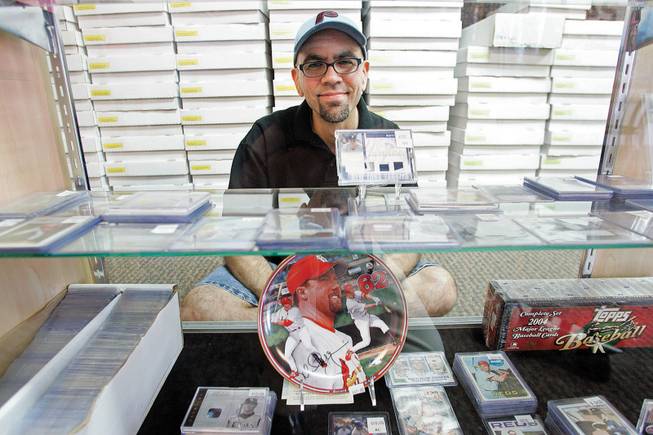Saturday, Sept. 13, 2008 | 2 a.m.
Reader poll
Rob Vandorick, 37, stays young by dealing in baseball cards.
Sun Archives
- Hooked on entrepreneurship (9-11-2008)
- Study outlines small businesses’ priorities for state government (9-15-2004)
For more than two decades, he has lorded over glass cases holding little pieces of cardboard that capture the imagination of the young and old alike.
But Vandorick is feeling the effects of a depressed economy. He is staying afloat by selling baseball cards online to supplement his small shop on Gibson Road in Henderson.
These days he is getting more calls from people looking to unload collections for some quick cash. He doesn’t want to be cold about it, but he’s paying only about 10 percent of the listed value of cards because so many are available. And everybody seems to be selling the same thing, mainly cards from the industry heyday in the ’80s and ’90s.
Unfortunately for the sellers, those cards haven’t held their value, meaning people who saved their allowance as kids to invest in Ken Griffey Jr. rookies will not be cashing in big.
Those are the cards being brought into Vandorick’s shop by people needing money. He was buying everything for a while. But it got too expensive and he’s getting more selective.
“When you need to pay the mortgage, cards aren’t that important,” he says. “I wish I could find a way to make a stew from all these cards.”
It is no surprise the baseball card business suffers during tough times. Even though the memorabilia business is thought to be a $2 billion industry, sports cards have little practical value.
The small businesses that trade in them likely will suffer most.
“I think when you look at the high-end part of the market, the people spending $100,000 on a vintage jersey from the 1940s, that probably has some Teflon” to protect it from economic downturns, says Pete Williams, author of “Sports Memorabilia for Dummies.”
Most dealers don’t sell six-figure products.
Jeremy Brown, owner of Ultimate Sports Cards & Memorabilia on Tenaya Way near Cheyenne Avenue, focuses on cards. The pricey autographed items in the store generally sell only during the holidays.
Brown says business is down about 20 percent this year. But he’s staying afloat by drawing some tourists and making smart investments, such as the Tony Romo rookie card he bought for $160 three years ago that’s now worth $1,750.
Such is the business, where values can skyrocket or plummet on a day-to-day basis depending on who had a good game — or who got injured or arrested. Michael Vick rookie cards worth $1,600 when he was on the field now fetch just $100 after the quarterback was convicted in a dog fighting case.
Raymond Lujan, owner of the Las Vegas-based Ray’s Clubhouse, an autographed memorabilia and framing business, has seen a nearly 30 percent drop in business since 2006. But he says he’s still doing well by selling his custom merchandise in Bally’s to tourists.
He also consigns pieces to a bar in the Miracle Mile Shops at Planet Hollywood and a series of local haircutting shops, even though it’s harder these days to find people who would buy $500 framed autographs on impulse.
Even smaller items are no easy sell, such as an unopened pack of football cards that is more like a lottery ticket because there’s no telling until the product is opened how valuable it will be.
“It’s gambling,” says Brown, noting buyers mostly hope to find a rare autographed card that can be worth as much as $12,000.
Nevertheless, they aren’t selling the way they used to.
“It’s hard to imagine people spending $4 for a pack of cards when gas is $4 a gallon,” Williams says.
Dealers aren’t seeing any boost in O.J. Simpson merchandise, which plays to a niche market at best but is generally considered worthless. The former football star is in town standing trial on armed robbery and kidnapping charges after police say he stormed into a Palace Station hotel room to recover sports memorabilia.
Local dealers say they don’t handle Simpson memorabilia, either because nobody buys it or because the merchandise sends the wrong message.
“I don’t want kids who come in here seeing guys going to jail,” Vandorick says. “I want it to be positive. I want them to see guys signing $50 million contracts with supermodels on their arms.”
At Field of Dreams in The Forum Shops at Caesars Palace, there also are no Simpson items.
But there are plenty of collectibles for those with expensive tastes — and there must still be plenty of money in play, given the line of buyers at the store Thursday. They were buying items such as $1,200 framed and autographed jerseys and photos signed by 20 members of the New England Patriots, going for $3,499.
In the front of the store, disgraced baseball star Pete Rose was signing autographs while watching horse racing on a small monitor.
If business is as good as the sales staff claims, it’s a boast that Vandorick can’t make at his little shop.
He’s happy that a fellow just bought four $49 packs of Playoff Absolute Memorabilia cards. But the buyer won’t give his name, worried that his wife will read about him in the newspaper.


Join the Discussion:
Check this out for a full explanation of our conversion to the LiveFyre commenting system and instructions on how to sign up for an account.
Full comments policy